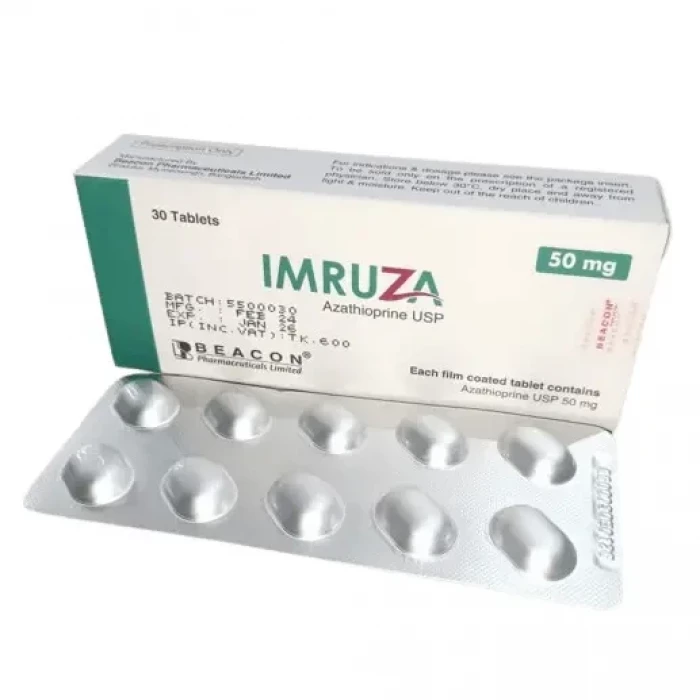
✔ 100% Authentic Product
👁️ Currently Viewing 2145
Imruza 25mg Tablet 30pcs Box
Azathioprine is used for preventing organ rejection in transplant patients, treating rheumatoid arthritis, and managing autoimmune diseases.
Discount
Price: ৳ 353
MRP:
৳
360
2%
Off

100% Genuine Products, Guaranteed

Safe & Secure Payments, Always

Fast, Secure & Efficient Delivery

Proper Packaging
 Cash on Delivery - All over Bangladesh
Cash on Delivery - All over Bangladesh Regular Delivery - 12-24 Hours, Dhaka City* Charge Tk.39-59
Regular Delivery - 12-24 Hours, Dhaka City* Charge Tk.39-59 Regular Delivery - 24-48 Hours, Other Cities* Charge Tk.99-110
Regular Delivery - 24-48 Hours, Other Cities* Charge Tk.99-110
 ফ্রি ডেলিভারিঃ - ৯৯৯ টাকা+ অর্ডারে, ঢাকা
শহরে
ফ্রি ডেলিভারিঃ - ৯৯৯ টাকা+ অর্ডারে, ঢাকা
শহরে ফ্রি ডেলিভারিঃ - ২৯৯৯ টাকা+ অর্ডারে, ঢাকার
বাহিরে
ফ্রি ডেলিভারিঃ - ২৯৯৯ টাকা+ অর্ডারে, ঢাকার
বাহিরে
100% Genuine Products, Guaranteed
Safe & Secure Payments, Always
Fast, Secure & Efficient Delivery
Proper Packaging
 Cash on Delivery - All over Bangladesh
Cash on Delivery - All over Bangladesh Regular Delivery - 12-24 Hours, Dhaka City* Charge Tk.39-59
Regular Delivery - 12-24 Hours, Dhaka City* Charge Tk.39-59 Regular Delivery - 24-48 Hours, Other Cities* Charge Tk.99-110
Regular Delivery - 24-48 Hours, Other Cities* Charge Tk.99-110 ফ্রি ডেলিভারিঃ - ৯৯৯ টাকা+ অর্ডারে, ঢাকা
শহরে
ফ্রি ডেলিভারিঃ - ৯৯৯ টাকা+ অর্ডারে, ঢাকা
শহরে ফ্রি ডেলিভারিঃ - ২৯৯৯ টাকা+ অর্ডারে, ঢাকার
বাহিরে
ফ্রি ডেলিভারিঃ - ২৯৯৯ টাকা+ অর্ডারে, ঢাকার
বাহিরে
✅ Description:
Imruza 25, containing azathioprine as its active ingredient, is prescribed for the treatment of organ transplants and certain autoimmune diseases. Azathioprine works by reducing the strength of the immune system.
It is crucial to use contraceptive methods while taking Azathioprine Tablets and for up to 3 months after completing the course of treatment, as the medication may pose risks during pregnancy. Therefore, it is advised to avoid Azathioprine Tablets if you are pregnant or breastfeeding.
Additionally, excessive exposure to sunlight should be avoided while on Azathioprine Tablets. It is recommended to wear protective clothing and use sunscreen with a high protection factor to minimize the risk of skin damage.
Safety Advices

Alcohol
UNSAFE
Avoid consumption of alcohol while taking Imruza 25. Consult your doctor before taking it.

Pregnancy
CONSULT YOUR DOCTOR
Imruza 25 is not recommended for use in pregnant women unless considered necessary. Consult your doctor before taking it.

Breastfeeding
CAUTION
Imruza 25 is not recommended for use in breastfeeding women as it may pass through the breast milk. Consult your doctor before taking it.

Driving
CAUTION
Do not drive or operate any machines if you feel dizzy after taking Imruza 25. Consult your doctor before taking it.

Kindey
CAUTION
Imruza 25 should be taken with caution in patients with kidney problems. Consult your doctor before taking it.

Liver
CAUTION
Imruza 25 is not recommended for use in patients with severe liver disease. Consult your doctor before taking it.
✔️ Uses of Imruza 25
✔️ How does Imruza 25 work?
Imruza inhibits DNA, RNA, and protein synthesis, suppressing the body's immune response. It also blocks certain chemical messengers responsible for inflammation in joint diseases.
✔️ Side Effects of Imruza 25
- Reduction in the platelet count
- Frequent infections (bacterial, viral and fungal)
- Bone marrow malfunction
- Allergic reactions
- Swelling and infection in the pancreas
- Diarrhea
✔️ Quick Suggestions:
- Your doctor has prescribed Imruza 25 to stop the body from rejecting a transplanted organ (e.g. kidney, heart, or liver).
- Imruza 25 also relieves joint pain and inflammation in rheumatoid arthritis.
- You may have to take additional medications along with Imruza 25 for better relief of symptoms.
- Avoid contact with people who have a cold, flu, or other contagious illness. Notify your doctor if you have any signs of infection such as a fever or sore throat.
- Inform your doctor if you are pregnant or planning to conceive or breastfeeding.
✔️ Indications
Imruza (azathioprine) is an immunosuppressant medication used either alone or in combination with other agents, such as corticosteroids, to influence the immune response.
- Organ Transplant: Imruza is used to enhance the survival of organ transplants, such as renal, cardiac, and hepatic transplants. It can also reduce the corticosteroid requirements of renal transplant recipients.
- Inflammatory Bowel Disease (IBD): Imruza is indicated for the treatment of moderate to severe IBD (Crohn's disease or ulcerative colitis) in patients who require corticosteroid therapy, cannot tolerate it, or have refractory disease.
Imruza has been used with clinical benefit in conditions like severe active rheumatoid arthritis, systemic lupus erythematosus, dermatomyositis, polymyositis, autoimmune chronic active hepatitis, pemphigus vulgaris, polyarteritis nodosa, autoimmune hemolytic anemia, and chronic refractory idiopathic thrombocytopenic purpura.
✔️ Pharmacology
- Imruza is an immunosuppressive antimetabolite that inhibits DNA, RNA, and protein synthesis.
- It is rapidly broken down in vivo into 6-mercaptopurine (6-MP) and amethylnitroimidazole.
- 6-MP is converted intracellularly into active purine thioanalogues.
- The therapeutic effect may take weeks or months to manifest.
- Oral use, at least 1 hour before or 2 hours after milk or dairy products.
- Standardize the method of administration; avoid milk or dairy products.
✔️ Dosage & Administration of Imruza 25
For organ transplant recipients, the initial dosage of Azathioprine may vary depending on the specific immunosuppressive regimen employed, but it can be up to 5 mg/kg of body weight per day, administered orally or intravenously on the first day of therapy. Maintenance dosages typically range from 1 to 4 mg/kg of body weight per day and should be adjusted based on clinical requirements and hematological tolerance. It's generally recommended to continue Azathioprine therapy indefinitely, even at low doses, to reduce the risk of organ rejection.
For other indications such as inflammatory bowel disease (IBD), the starting dosage is typically between 1 to 3 mg/kg of body weight per day. The maintenance dosage can be adjusted within this range based on the clinical response and hematological tolerance of the individual patient. If there's no improvement in the patient's condition within three months, discontinuation of Azathioprine should be considered. However, for patients with IBD, treatment should typically continue for at least twelve months, as the response to treatment may not be clinically apparent until after three to four months.
Dosage adjustments may be necessary for certain patient populations:
- Overweight children may require higher doses, necessitating close monitoring of treatment response.
- Elderly patients should generally receive lower dosages, although side effects incidence isn't necessarily higher in this population.
- Patients with renal impairment may require a dosage reduction.
- Patients with hepatic impairment should also have their dosage adjusted accordingly.
Imruza 25 is administered orally and should be taken at least 1 hour before or 2 hours after consuming milk or dairy products.
✔️ Interaction of Imruza 25
Here are some important drug interactions to be aware of when taking Imruza 25:
- Allopurinol/Oxipurinol/Thiopurinol: When taken with allopurinol, oxipurinol, or thiopurinol, the dosage of Imruza 25 should be reduced to 25% of the original dose to avoid potential adverse effects.
- Neuromuscular Blocking Agents: There may be significant variation in the potency of the interaction between Imruza 25mg and neuromuscular blocking agents such as succinylcholine and tubocurarine. Close monitoring is warranted if these drugs are used concomitantly.
- Anticoagulants: Imruza 25mg may inhibit the effect of anticoagulants like warfarin, potentially leading to altered blood clotting parameters. Monitoring is advised when these drugs are used together.
- Cytostatic/Myelosuppressive Agents: Concomitant administration of cytostatic drugs or other agents with myelosuppressive effects, such as penicillamine, should be avoided if possible due to the potential for additive myelosuppression.
- Methotrexate: When Imruza 25mg is given with high-dose methotrexate, dosage adjustments may be necessary to maintain an appropriate white blood cell count.
- Vaccines: The immunosuppressive activity of Imruza 25mg may lead to an atypical or harmful response to live vaccines. Therefore, live vaccines are contraindicated during Imruza 25 therapy. Additionally, the response to killed vaccines, such as the hepatitis B vaccine, may be diminished.
- Ribavirin: Severe myelosuppression has been reported with concurrent use of Imruza 25 and ribavirin, so co-administration should be avoided.
- Aminosalicylate Derivatives: Aminosalicylate derivatives like olsalazine, mesalazine, or sulphasalazine may inhibit the activity of the TPMT enzyme. This may necessitate lower doses of Azathioprine to avoid toxicity.
✔️ Contraindications
- Allergy: Imruza 25 should not be used in patients with a known allergy to the medication. If you have experienced an allergic reaction to Imruza 25 or any of its components in the past, it is important to inform your healthcare provider before starting treatment.
- Alkylating agents: Imruza 25 is not recommended for patients with rheumatoid arthritis who have been previously treated with alkylating agents such as cyclophosphamide or chlorambucil. Prior use of these agents may influence the effectiveness or safety of Imruza 25 tablets. It's essential to discuss your medical history with your doctor to determine the most suitable treatment options.
✔️ Pregnancy & Lactation
- Teratogenicity: There is uncertain evidence regarding the teratogenic effects of Imruza 25 in humans. However, as with all cytotoxic chemotherapy drugs, it is recommended to take adequate contraceptive precautions when either partner is receiving Imruza 25 to avoid potential harm to the fetus.
- Mutagenicity: Chromosomal abnormalities have been observed in the lymphocytes of offspring born to patients treated with Imruza 25. These abnormalities typically resolve over time, and in most cases, there are no apparent physical abnormalities in the offspring. However, Imruza 25 in combination with long-wave ultraviolet light has been shown to have a synergistic clastogenic effect in patients treated for various disorders.
- Contraception: Women of childbearing potential should use effective contraceptive measures while being treated with Imruza 25 and for one month following the completion of treatment. Men are also advised to use effective contraceptive measures and avoid fathering a child while receiving Imruza 25 and for three months after completing treatment.
- Fertility: The specific effects of Imruza 25 therapy on human fertility are not well understood.
- Pregnancy: Imruza 25 and its metabolites can pass through the placenta and amniotic fluid from the mother to the fetus. Due to the potential risks associated with Imruza 25 during pregnancy, it is classified as Pregnancy Category D. It should not be given to pregnant patients or those likely to become pregnant without careful assessment of the risks versus benefits.
- Lactation: It is recommended that mothers receiving Imruza 25 mg should not breastfeed, as 6-mercaptopurine, a metabolite of Imruza 25g, has been detected in colostrum and breast milk.
✔️ Precaution & Warnings:
- Inform your doctor if you have any liver or kidney problems before starting treatment with Azathioprine. Your doctor may need to adjust your dosage or monitor you more closely during treatment.
- If you have a condition where your body produces too little TPMT, it's important to discuss this with your doctor before taking Azathioprine. TPMT deficiency can affect how your body processes the medication, and your doctor may need to adjust your dosage accordingly.
- Let your doctor know if you have an untreated infection before starting treatment with Azathioprine. Infections can interact with the medication or worsen while taking it, so your doctor needs to assess and manage any infections before starting treatment.
- If you are scheduled to undergo surgery, inform your healthcare provider that you are taking Azathioprine. Certain muscle relaxants used during surgery may interact with Azathioprine, so your doctor may need to adjust your medication regimen accordingly.
- If you have a rare genetic disorder called Lesch-Nyhan syndrome, discuss this with your doctor before starting Azathioprine. This condition may affect how your body responds to the medication, and your doctor will need to consider the risks and benefits of treatment carefully.
- Avoid excessive exposure to sunlight while taking Azathioprine. Wear protective clothing and use sunscreen with a high protection factor to reduce the risk of sunburn and skin damage.
- Treatment with Azathioprine may increase your risk of developing a specific type of cancer called a lymphoproliferative disorder. It's important to discuss this risk with your doctor and undergo regular monitoring during treatment.
- If you are taking multiple immunosuppressant medications along with Azathioprine, you may be at increased risk of disorders of the lymph system due to viral infection. Your doctor will monitor you closely for any signs of infection or complications.
- There is an increased risk of developing a serious condition called Macrophage Activation Syndrome while taking Azathioprine, especially in individuals with certain types of arthritis. Your doctor will monitor you for symptoms of MAS and adjust your treatment as needed.
- Your doctor may recommend frequent blood tests and follow-up visits during treatment with Azathioprine to monitor your response to the medication and adjust your dosage accordingly. Be sure to attend all scheduled appointments and follow your doctor's instructions carefully.
✔️ Storage Conditions
- Keep the Imruza 25 Tablet out of the sight and reach of children and pets.
- Store below 30°C in the original package.
- Discard off the expired and unused medicine appropriately
⚠️Disclaimer:
At ePharma, we’re committed to providing accurate and accessible health information. However, all content is intended for informational purposes only and should not replace medical advice from a qualified physician. Please consult your healthcare provider for personalized guidance. We aim to support, not substitute, the doctor-patient relationship.








